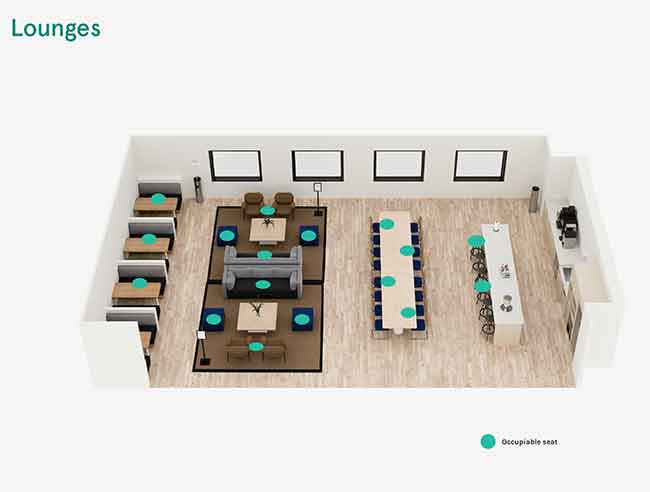THE sudden upsurge of coronavirus disease 2019 (Covid-19) cases has prompted businesses worldwide to make adjustments on how they transact with the realization that they can no longer go back to the way it was before.

While the pandemic has brought about the sudden changes in business strategies, a lot of businesses have come to accept what has come to be known as the “new work order.”
“Covid-19 has highlighted greater emphasis on addressing new workspace realities and how we approach the design of our spaces is a critical component to implementing our Future of Workplace Plan,” said Ray Tan, head of Growth, WeWork Southeast Asia and Korea.
With fixed costs arising from real estate leases and expenses, all forms of businesses have focused on maintaining operational and cost efficiency. Given the unpredictability and speed of how fast things change, turning to space-as-a-service providers like WeWork can prove to be a prudent move for businesses in the long run.

In the Philippines, WeWork has been working hard to redefine what the future workplace looks like given the new reality presented by the pandemic.
WeWork has made enhancements that sets it apart from more traditional commercial real estate operators, beyond focusing on the typical private office space and conference rooms. The company focuses on three key areas: prioritizing personal space, cleanliness, and behavioral signages.
In its Philippine offices, WeWork spaces have been modified through staggered seating, buffer zones and signages reinforcing new cleaning standards and capacity protocols.
WeWork’s offices are located in The Brilliance Center, Menarco Tower, Uptown Bonifacio Tower Three, and Milestone at 5th Avenue in Taguig City and RCBC Plaza in Makati City.
These enhancements were to ensure the company’s products meet new member expectations when it comes to social distancing and cleanliness, while continuing to maintain its value proposition in providing members a sense of community and connection within its spaces.
By moving away from a fixed workspace, shifting the budget to other key business priorities can help businesses survive in these trying times.
WeWork has provided four reasons why co-working spaces are a wise and pragmatic choice as companies face the new normal:
Having a sense of community
Co-working spaces encourages a diverse community. This allows companies to preserve company culture, employee integration and experience to drive productivity, motivation and connection. Maintaining collaboration between business groups and the government will be a key part of rebuilding the economy. Having shared spaces increase commissions and connections, expand businesses, create jobs, and stimulate the economy.
Even as Metro Manila remains under community quarantine, WeWork still ensures everyone within its community is connected through webinars and sessions with business leaders or members to sustain continuous exchange of ideas.
Empowering sustainable work arrangements
Remote working brings questions of sustainability in the long run. Employers need to take into account employees’ resources, productivity, and mental well-being. On the contrary, many leaders have addressed the importance of physical workspace how in-person interaction matters for innovation, relationships, and culture.
As the new normal is influenced by these new set of norms, WeWork has collaborated with companies to deliver flexible workspace arrangements by combining the best plans together to create hybrid schemes.
Adding flexibility to businesses
Covid-19’s impact on the economy has shown the need for organizations to take a conservative approach as far as operational needs are concerned such as lease flexibility. During this period, businesses had to make quick operational decisions and WeWork’s ability allowed them scale down three times faster than traditional options. By bringing agility to their portfolio with flexible terms and innovative deal structures, businesses have also saved up to 50 percent of committed costs.
Supporting business continuity efforts
Business continuity plans are critical for weathering through a crisis in order to instill confidence in business operations. The pandemic has reinforced physical workspaces as essential for continuity of business operations. A co-working space serves to help its members drive business efficiency by offering flexible services, tools, and strategies that can help businesses be well-equipped and prepared for future crises.
Proactive conversations have been happening among members and non-members to better understand the importance of space-as-a-service as part of their business continuity planning strategy. This also illustrates how the solutions provided by co-working spaces are deemed crucial and part of their future-proofing strategies.
In conclusion, the new work order is here and there is no going back to the way it was before the pandemic. The challenge businesses now face is to adapt both efficiently as industries move towards recovery.
WeWork continues to redefine the future of work for more productive office environments reflective of the new normal. This is done by making changes to its products, design, and services to meet new expectations from professional distancing to cleanliness standards.
“As a company, we are continuing to evolve these plans to ensure the health and well-being of our members. Our goal is to ensure these renewed workplace standards are safely executed across Manila and our global portfolio. Through our learning with executive decision makers from industry leading companies locally and globally, we are also seeing companies re-calibrating their traditional real estate portfolio based on their operational needs. As a workspace partner to our members, we remain committed to help them tackle potential opportunities and challenges ahead,” said Tan.
#realestateblogph | #realestateblogphpropertyfeature | #REBPH
Article and Photo originally posted by The Manila Times last August 11, 2020 and written by Johannes Chua







More Stories
Rockwell adjusts property projects to ‘new normal’
Brokers almost gone broke
Pag-IBIG loan policies set to help borrowers keep homes amid pandemic